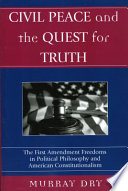 | Helen Keller - 2003 - 102 pages
...Court would later uphold the legality of serious infringements of freedom of speech on the basis that "when a nation is at war many things that might be said in time of peace are such a hindrance to its efforts that their utterance will not be endured so long as men fight." Dissent was now a treasonable... | |
 | Drew Noble Lanier - 2003 - 284 pages
...historically been less receptive to civil liberties claims during times of war. "As Justice Holmes wrote, '[w]hen a nation is at war many things that might be said in times of peace are such a hindrance to its effort that their utterance will not be endured so long... | |
 | John Schrems - 2004 - 408 pages
...that an act must be judged in the circumstances in which it occurs. Justice Holmes pointed out that "when a nation is at war many things that might be...regard them as protected by any constitutional right." In other words, "the character of every act depends upon the circumstances in which it is done," adding... | |
 | Maryann Zihala - 2005 - 234 pages
...the substantive evils that Congress has a right to prevent. It is a question of proximity and degree. When a nation is at war many things that might be...regard them as protected by any constitutional right. It seems to be admitted that if an actual obstruction of the recruiting service were proved, liability... | |
 | Andrea Bianchi, Yasmin Naqvi - 2004 - 573 pages
...of Civil Liberties in the United States, at 71 (WW Norton, New York, 1979). outcome of the tension: "When a nation is at war many things that might be...could regard them as protected by any constitutional right."7 During World War II, the United States Supreme Court sanctioned the curfew and internment... | |
 | Joy Hakim - 2003 - 438 pages
...present danger that they will bring about the substantive evils that Congress has a right to prevent. When a nation is at war many things that might be...as men fight and that no Court could regard them as being protected by any constitutional right. Holmes will refine that doctrine in a series of decisions... | |
 | Geoffrey R. Stone - 2004 - 758 pages
...the substantive evils that Congress has a right to prevent. It is a question of proximity and degree. When a nation is at war many things that might be...utterance will not be endured so long as men fight and no Court could regard them as protected by any constitutional right. . . .244 Like President Lincoln... | |
 | David L. Faigman - 2004 - 440 pages
...writing, disagreed. Holmes admitted that in peacetime, the defendants' words would be protected. However, "[w]hen a nation is at war many things that might...utterance will not be endured so long as men fight." Holmes wrote that the "question in every case is whether the words used are used in such circumstances... | |
 | Murray Dry - 2004 - 324 pages
...the substantive evils that Congress has a right to prevent. It is a question of proximity and degree. When a nation is at war many things that might be...their utterance will not be endured so long as men light and that no Court could regard them as protected by any constitutional right. The statute . .... | |
 | David M. Kennedy - 2004 - 452 pages
...those cases, Schenck v. United States, Justice Oliver Wendell Holmes, Jr., articulated the theory that "when a nation is at war many things that might be...effort that their utterance will not be endured." 89. Chafee, Free Speech, 80. 90. Masses Publishing Co. v. Patten, 244 Fed. 535 (So. Dist., NY, 1917).... | |
| |